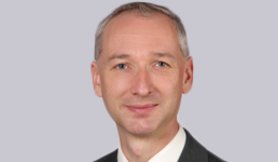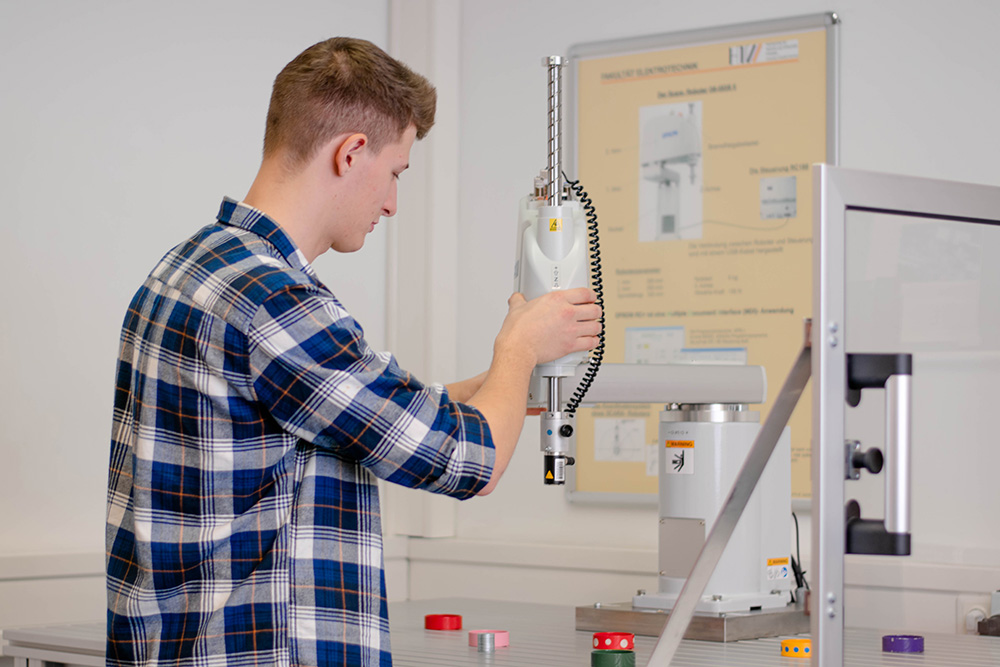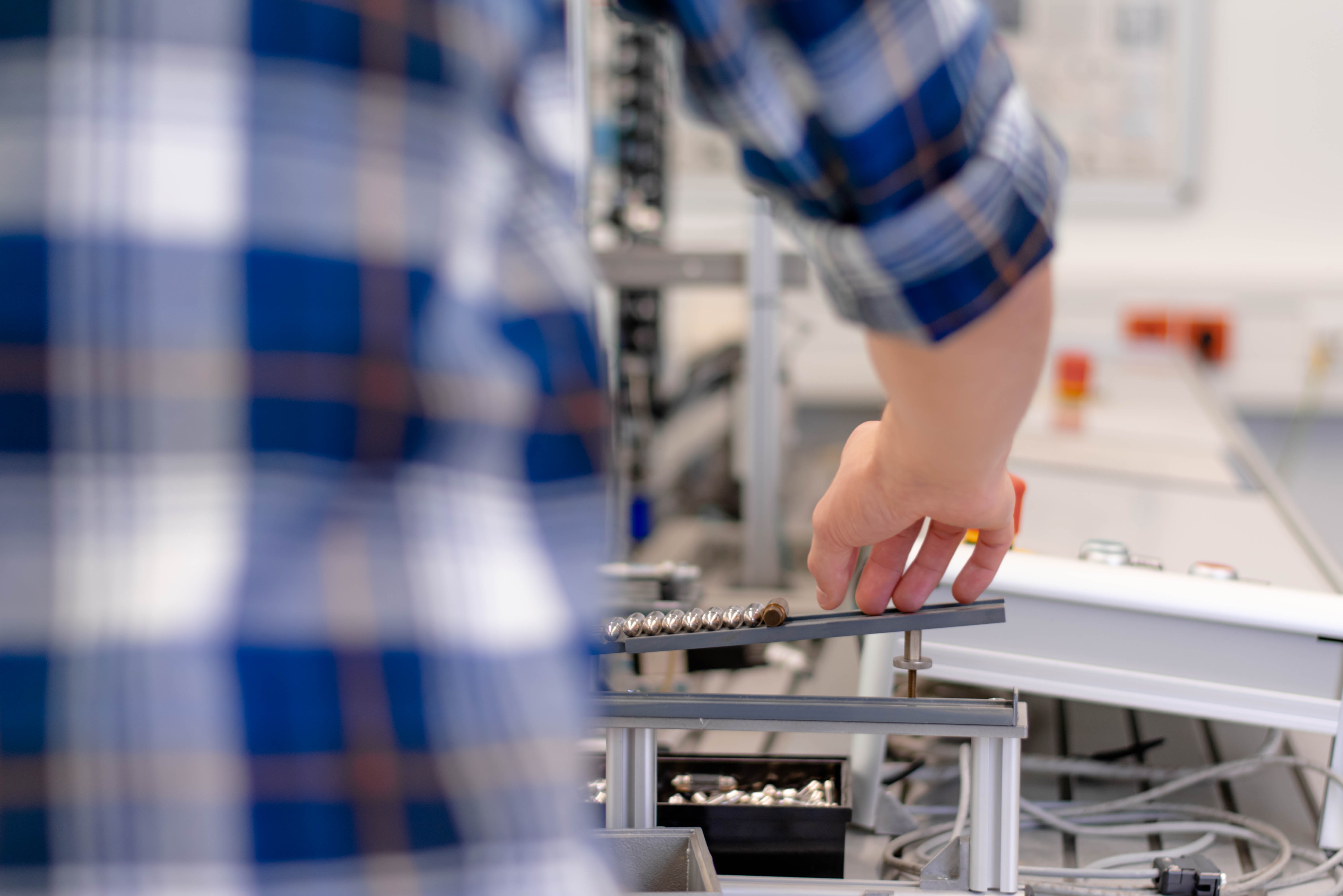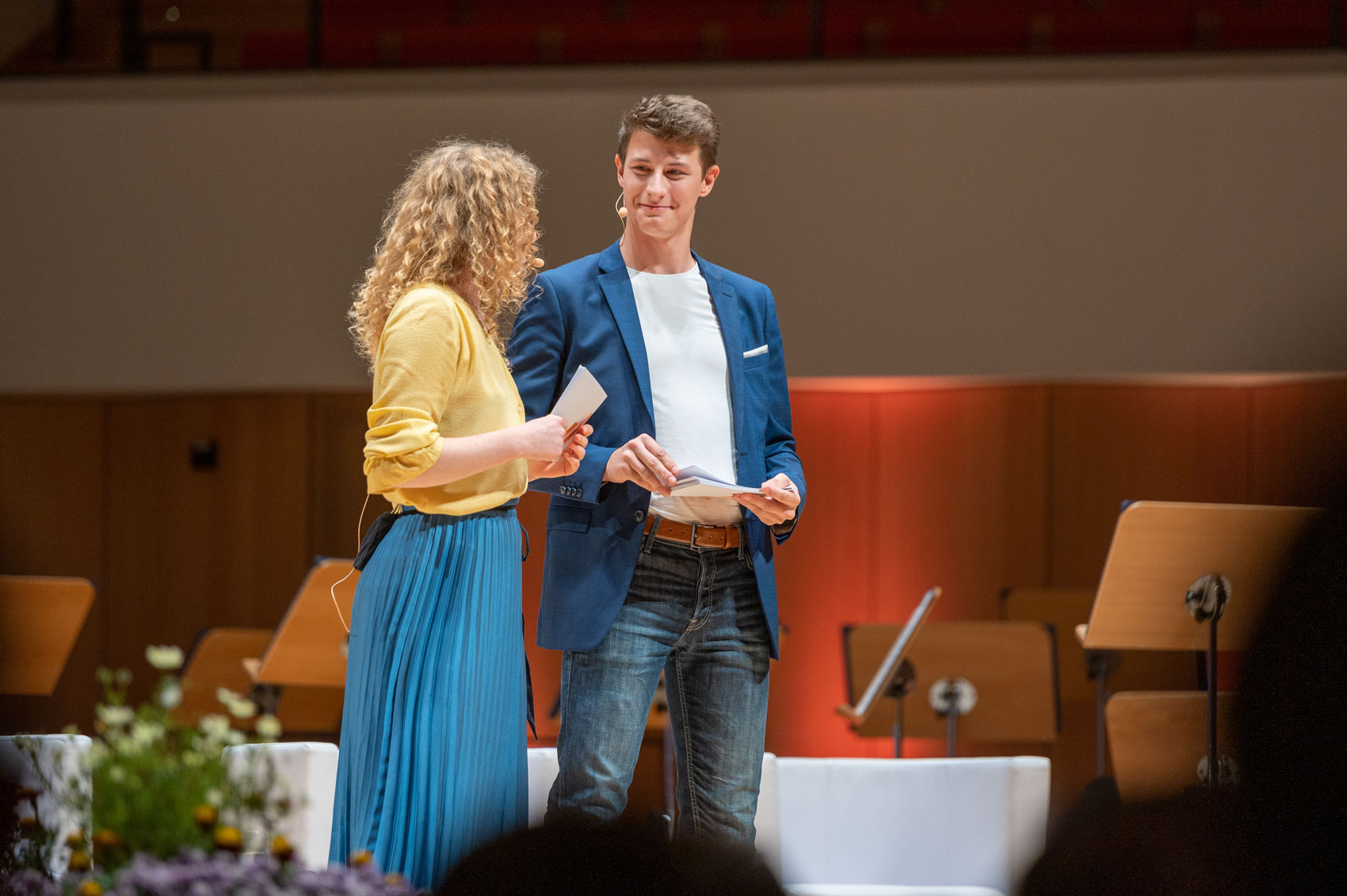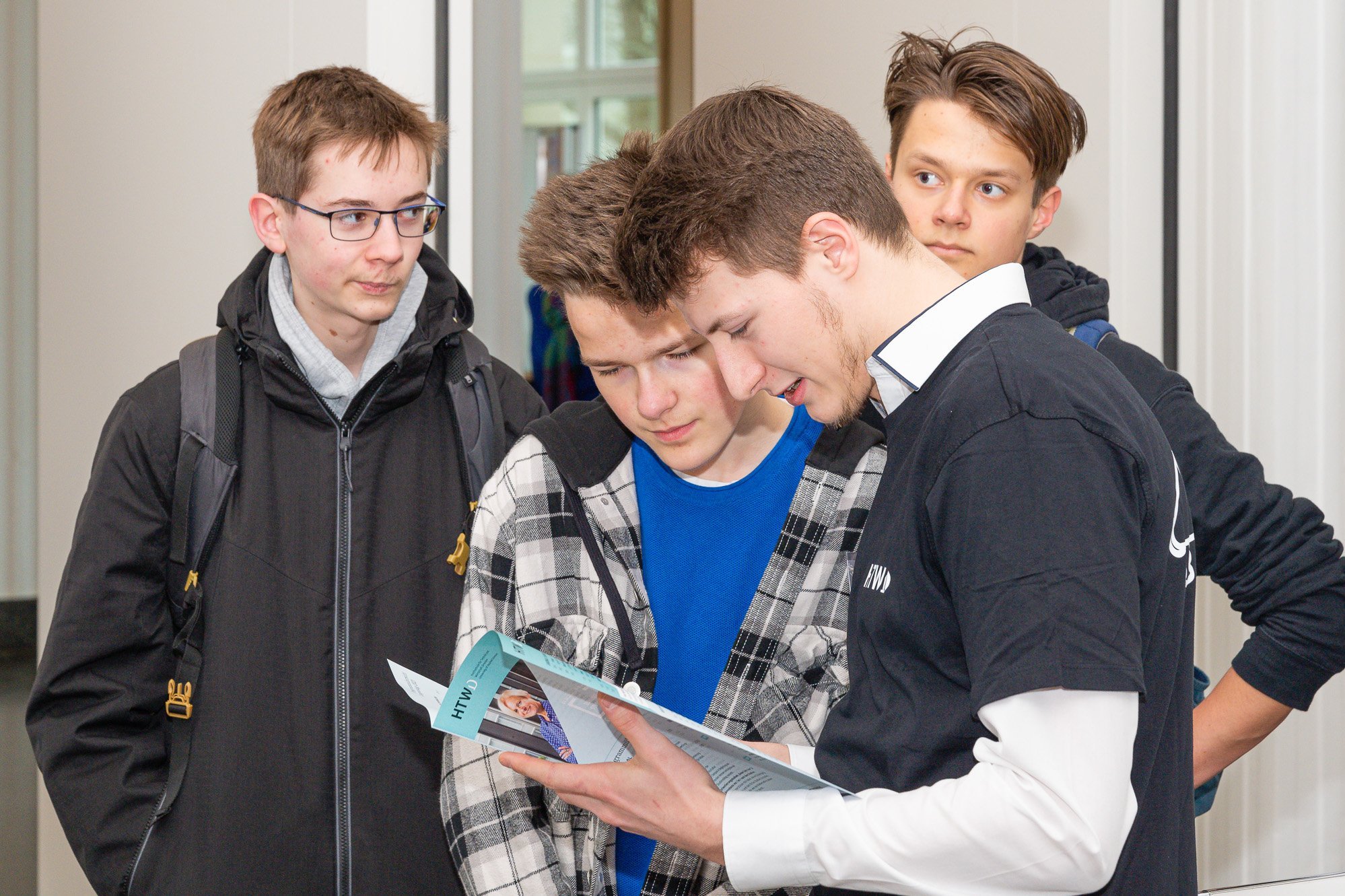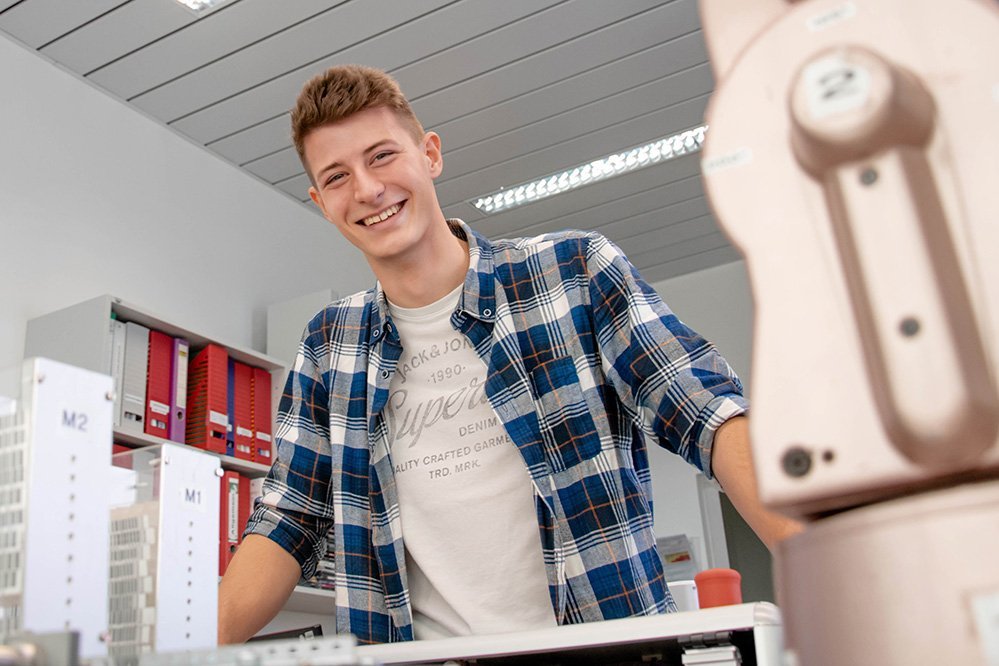
Jonas about his study programme Electrical Engineering and Information Technology
Jonas is currently in his 7th semester studying electrical engineering and information technology, specialising in mechatronics. Alongside his studies, as a study guide he meets prospective students at information days and helps them find their way to the right degree programme. In this interview, the student reveals why a technical degree programme is a good option.
What made you decide to study electrical engineering?
I already spent a lot of time in the robotics club during my time at grammar school. As part of the team, we took part in competitions such as the First Lego League several times and even came second once with the robot we built ourselves. My fascination with mechatronic, electrotechnical and robotic systems prompted me to write my scientific project on the subject of 'exoskeletons'. This technical interest was the foundation stone for my interest in studying in this field. Ultimately, I was convinced by a very open and detailed discussion with a professor at the faculty. At an open day, he recommended that I study electrical engineering with a specialisation in mechatronics. What I find particularly interesting about my chosen specialisation, mechatronics, is the interdisciplinary approach of electrical engineering, mechanical engineering and computer science. The modules and internships on offer make the theory easier to understand. This degree programme offers a variety of challenges and exciting opportunities. The electrical engineering subject and the various specialisations open up numerous fields of work and employment opportunities.
Can you tell us a bit more about the Electrical Engineering degree programme?
In general, I would describe my degree programme as very practice-oriented. Thanks to a wide range of laboratory internships with excellent supervision, students can gain insights and practice in a wide variety of subject areas during their studies. These internships provide a good balance to the theory taught in the lectures. The new degree programme (since winter semester 2022/23) is divided into three specialisations: Energy and Drives, Information and Electronics and Automation and Mechatronics - in the broadest sense of my field. During the degree programme, students are also required to complete a one-semester internship in a practical company where they can apply and implement what they have learned.
Individual projects are developed in teams using an Arduino kit. This gives you a first impression of what is possible in electrical engineering.
Was there a favourite project that you particularly enjoyed?
I would describe the project in the first semester as my favourite project. Individual projects are developed in teams using an Arduino kit. This gives you a first impression of what is possible in electrical engineering.
What does your typical day at university look like?
A typical day for me consists of attending lectures and tutorials, followed by lunch in the canteen with my fellow students. In the afternoon, there are often more lectures or internships. Of course, there are also meetings with friends and sporting activities to balance out my studies.
What career prospects do graduates of an electrical engineering degree programme have?
The electrical engineering degree programme is a foundation course. It offers job opportunities in various fields such as robotics, the automotive industry or the printed circuit board industry. Here in Dresden and the surrounding area in particular, there are numerous opportunities and a wide range of jobs on offer. Initial contacts with companies can be made at the university's career fair.
What connects you to HTW Dresden and what experience has had a particular impact on you?
First and foremost, of course, I associate my studies with the university and my voluntary work with the Study Guides. This enabled me to build up a large circle of acquaintances and make many good friends in a very short time. I like being at a university of a manageable size, where students and lecturers know each other by name and open communication is possible. At HTW Dresden, you are also encouraged to get actively involved and help shape the university. I find that very positive. Of course, Dresden and the surrounding area are absolutely beautiful and worth living in. Of course, my time at the university is characterised by many wonderful memories. One highlight was my own first semester induction (ESE) three years ago. Another highlight was the matriculation ceremony in the winter semester 2022/23, where I was allowed to take over the moderation in the Kulturpalast together with a fellow student Cora. It was an incredibly exciting and interesting event and a unique opportunity to get involved in university life.
What is your favourite place on campus?
My favourite place is undoubtedly the rose garden. It is located between the seminar building and the library and is a meeting place for students from different degree programmes. It is located between the seminar building and the library and is a meeting place for students from different degree programmes. In summer, it is a place to study and relax. The rose garden is also used every year by the StuRa for barbecues and faculty parties.
Describe the university in three words?
Familiar, individual and practical!
What wishes do you have for the future of your university?
If I could wish for something, it would be great if the university could grow but still remain close to the students. A mixture of tradition, innovation and creativity should form the basis for the development of degree programmes that appeal to prospective students and are relevant to society as a whole in order to be able to assert itself in the future.
Find out more
Weitere Dokumente/ Antragsformulare finden Sie hier: https://www.htw-dresden.de/en/hochschule/aktuelles/translate-to-english-news
Next study orientation event
Contact
M.A. Mira Höfler
- Z 124
- +49 351 462 3519
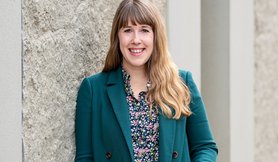
Prof. Dr.-Ing. Matthias Henker
- Z 441
- +49 351 462 2700
